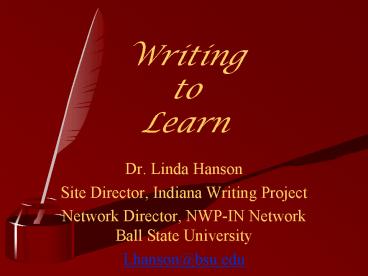Writing to Learn - PowerPoint PPT Presentation
1 / 22
Title:
Writing to Learn
Description:
But the crisis in writing goes beyond these visible signs. ... Writing instruction begins in kindergarten and continues through university. ... – PowerPoint PPT presentation
Number of Views:608
Avg rating:3.0/5.0
Title: Writing to Learn
1
Writing to Learn
- Dr. Linda Hanson
- Site Director, Indiana Writing Project
- Network Director, NWP-IN Network Ball State
University - Lhanson_at_bsu.edu
2
"The press continually reminds us that students
can no longer punctuate, use proper grammar,
spell correctly, or write legibly. But the
crisis in writing goes beyond these visible
signs. People do not see themselves as writers
because they believe they have nothing to say
that is of value or interest to others."
Donald Graves
3
NWP assumptions that emerged from teacher
research and practice . . .
- Writing is pivotal to learning, academic
achievement, and job success.
4
- Writing instruction begins in kindergarten and
continues through university.
5
- Effective teachers of writing regularly write
themselves.
6
- Writing is fundamental to learning in all
subjects
7
What do these assumptions mean for classroom
practice?
8
What does writing mean? Why must writing
instruction continue from kindergarten
through university? What advantage do
teachers of writing gain by writing
themselves? What does writing have to do
with learning? What kind of a
classroom environment supports
these assumptions? What roles does
the teacher play in such a
classroom?
9
Processes that correlated with higher student
achievement in 2002 NAEP Discussing
writing with their teachers Planning
their writing in advance
Writing more than one draftEngaging in
various stages of the writing process Using a
computer to write Writing long answers to
questions that involved reading Prewriting
Writing in a log or journal
10
Zemmelman and Daniels . . .
11
When I first became involved in the writing
project, what clicked right away was that writing
itself--the process of writing--was the same as
the scientific method. Hypothesize, experiment,
revise your thinking--writing is a discovery
process. Writing, in fact, is the vehicle for
the scientific method.
12
Writing
Process Collect Focus Order Develop
Clarify Donald
Murray
13
(No Transcript)
14
Research on the composing process has shown that
writing is not a simple process of transcribing a
predetermined text, but a complex process of
discovery. John S. Mayher
Nancy Lester
Gordon M. PradlLearning to
Write/Writing to Learn
15
Learning is a messy, mumbled, nonlinear,
recursive, and sometimes unpredictable process.
Carol Avery Learning
comes from taking risks. . . .
16
If students are to make knowledge their own, they
must struggle with the details, wrestle with the
facts, and rework raw information and dimly
understood concepts into language they can
communicate to someone else. In short, if
students are to learn, they must write.
The Neglected R
17
Not all writing is carried through a full writing
process to publication--nor need it be.
18
Scaffolding . . . More scaffolding . . .
19
Blooms Taxonomy--levels of thinking for all
academic areasknowledge comprehension applica
tion analysis synthesis evaluation
20
Which of your writing tasks would you classify as
informal writing?Which would you class as
formal writing projects?
21
Which writing tasks do you evaluate formally?
22
Evaluation CriteriaGoals for task determine
evaluation criteriaCompletionAssignment
CriteriaContentRubric































